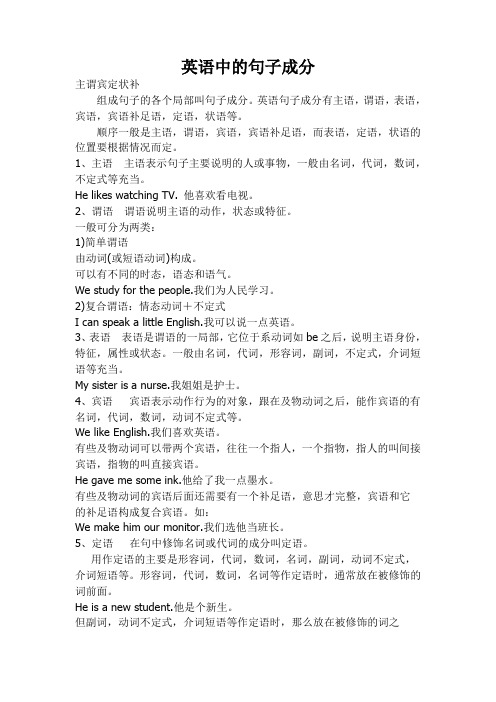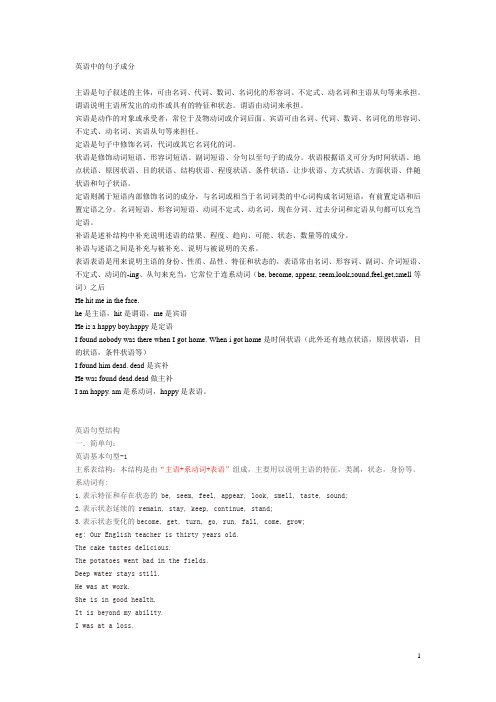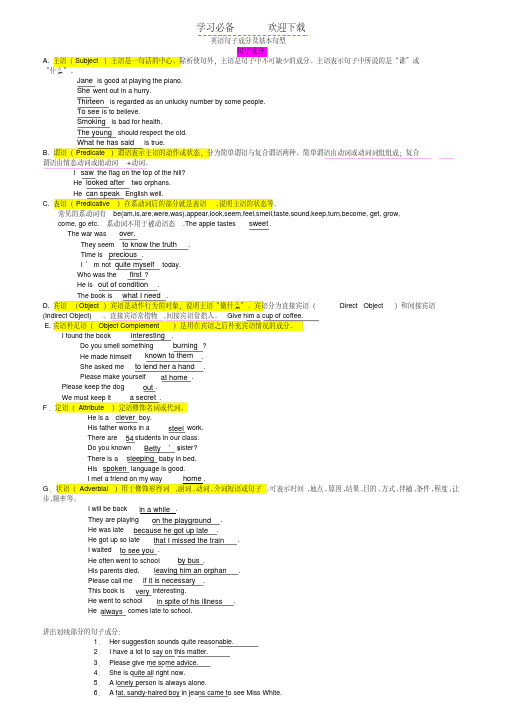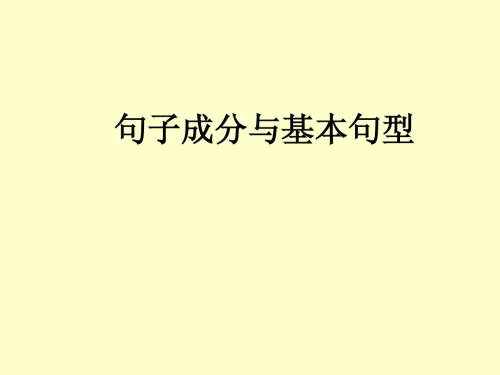英语句子成分
英语中的句子成分

英语中的句子成分主谓宾定状补组成句子的各个局部叫句子成分。
英语句子成分有主语,谓语,表语,宾语,宾语补足语,定语,状语等。
顺序一般是主语,谓语,宾语,宾语补足语,而表语,定语,状语的位置要根据情况而定。
1、主语主语表示句子主要说明的人或事物,一般由名词,代词,数词,不定式等充当。
He likes watching TV. 他喜欢看电视。
2、谓语谓语说明主语的动作,状态或特征。
一般可分为两类:1)简单谓语由动词(或短语动词)构成。
可以有不同的时态,语态和语气。
We study for the people.我们为人民学习。
2)复合谓语:情态动词+不定式I can speak a little English.我可以说一点英语。
3、表语表语是谓语的一局部,它位于系动词如be之后,说明主语身份,特征,属性或状态。
一般由名词,代词,形容词,副词,不定式,介词短语等充当。
My sister is a nurse.我姐姐是护士。
4、宾语宾语表示动作行为的对象,跟在及物动词之后,能作宾语的有名词,代词,数词,动词不定式等。
We like English.我们喜欢英语。
有些及物动词可以带两个宾语,往往一个指人,一个指物,指人的叫间接宾语,指物的叫直接宾语。
He gave me some ink.他给了我一点墨水。
有些及物动词的宾语后面还需要有一个补足语,意思才完整,宾语和它的补足语构成复合宾语。
如:We make him our monitor.我们选他当班长。
5、定语在句中修饰名词或代词的成分叫定语。
用作定语的主要是形容词,代词,数词,名词,副词,动词不定式,介词短语等。
形容词,代词,数词,名词等作定语时,通常放在被修饰的词前面。
He is a new student.他是个新生。
但副词,动词不定式,介词短语等作定语时,那么放在被修饰的词之后。
The bike in the room is mine.房间里的自行车是我的。
英语句子成分

句子成分句子是由词按照一定的语法结构组成的。
组成句子的各个部分叫做句子的成分。
句子的成分包括:主语、谓语、表语、宾语(直接和间接宾语)、补足语、定语、状语、同位语和插入语。
主语和谓语是句子的主体部分(在英语中,一般句子必须有主语和谓语),表语、宾语和宾语的补足语是谓语里的组成部分。
其他成份如定语和状语是句子的次要成分。
▲句子成分分类一.主语主语是谓语陈述的对象,表示所说的“是什么”或“是谁”。
一般由名词、代词、数词、动词不定式、动名词、不定代词、、从句(主语从句)充当。
大多数主语都在句首。
如:1.The classroom is very big.2.We work in a big factory.3. Three are enough. 三个人就够了4. What we need is food.5. Seeing is believing. 眼见为实6. To do is harder than to say.7. Everyone is here. 8. The rich are not always happy.▲在“There be …”句型中,主语的位置在中间。
如:There is a bird in the tree.▲在个别句型中,主语在整个句子后面,这时前面用it作形式主语。
如:1. It's very important for us to learn English well.2. Are you a student?3. Do you like English songs?4. There stands a policeman二.谓语谓语时用来说明主语“做什么”、“是什么”或“怎么样”,谓语必须是动词,它有时态、语态和语气的变化,并受主语人称和数的影响,谓语和主语在“人称”和“数”两方面必须一致。
(主谓一致原则)如:1.He is very generous.2.She looks very smart and cool3.We have finished the job.4.He can speak German.5.The flowers are often watered by me.(一)、动词的意义:表示动作或状态。
英语中的句子成分

英语中的句子成分主语是句子叙述的主体,可由名词、代词、数词、名词化的形容词、不定式、动名词和主语从句等来承担。
谓语说明主语所发出的动作或具有的特征和状态。
谓语由动词来承担。
宾语是动作的对象或承受者,常位于及物动词或介词后面。
宾语可由名词、代词、数词、名词化的形容词、不定式、动名词、宾语从句等来担任。
定语是句子中修饰名词,代词或其它名词化的词。
状语是修饰动词短语、形容词短语、副词短语、分句以至句子的成分。
状语根据语义可分为时间状语、地点状语、原因状语、目的状语、结构状语、程度状语、条件状语、让步状语、方式状语、方面状语、伴随状语和句子状语。
定语则属于短语内部修饰名词的成分,与名词或相当于名词词类的中心词构成名词短语,有前置定语和后置定语之分。
名词短语、形容词短语、动词不定式、动名词、现在分词、过去分词和定语从句都可以充当定语。
补语是述补结构中补充说明述语的结果、程度、趋向、可能、状态、数量等的成分。
补语与述语之间是补充与被补充、说明与被说明的关系。
表语表语是用来说明主语的身份、性质、品性、特征和状态的,表语常由名词、形容词、副词、介词短语、不定式、动词的-ing、从句来充当,它常位于连系动词(be, become, appear, seem,look,sound,feel,get,smell等词)之后He hit me in the face.he是主语,hit是谓语,me是宾语He is a happy boy.happy是定语I found nobody was there when I got home. When i got home是时间状语(此外还有地点状语,原因状语,目的状语,条件状语等)I found him dead. dead是宾补He was found dead.dead做主补I am happy. am是系动词,happy是表语。
英语句型结构一.简单句:英语基本句型-1主系表结构:本结构是由“主语+系动词+表语”组成,主要用以说明主语的特征,类属,状态,身份等。
英语句子成分及基本句型

英语句子成分及基本句型句子成分A. 主语(Subject)主语是一句话的中心。
除祈使句外,主语是句子中不可缺少的成分。
主语表示句子中所说的是“谁”或“什么”。
Jane is good at playing the piano.She went out in a hurry.Thirteen is regarded as an unlucky number by some people.To see is to believe.Smoking is bad for health.The young should respect the old.What he has said is true.B. 谓语(Predicate)谓语表示主语的动作或状态,分为简单谓语与复合谓语两种。
简单谓语由动词或动词词组组成;复合谓语由情态动词或助动词+动词。
I saw the flag on the top of the hill?He looked after two orphans.He can speak English well.C. 表语(Predicative)在系动词后的部分就是表语,说明主语的状态等。
常见的系动词有be(am,is,are,were,was),appear,look,seem,feel,smell,taste,sound,keep,turn,become, get, grow,come, go etc.系动词不用于被动语态.The apple tastes sweet.The war was over.They seem to know the truth.Time is precious.I’m not quite myself today.Who was the first?He is out of condition.The book is what I need.D. 宾语(Object)宾语是动作行为的对象,说明主语“做什么”。
英语句子成分

(二)谓语:谓语说明主语所做的动作或 具有的特征和状态。动词在句中作谓语, 一般放在主语之后。谓语的构成如下: 1、简单谓语:由一个动词或动词短语构成。 如: He came late again. The sun rises in the east. 2、复合谓语:(1)由情态动词或其他助 动词加动词原形构成。如: 1.You may keep the book for two weeks. 2.He has caught a bad cold.
4)宾语:宾语表示动作的对象或承受者,一般位 于及物动词和介词后面。例如: ①I went to see an exhibition yesterday.(名词) ②My mom loves me.(代词) ③How many dictionaries do you have? I have five.(数词) ④They helped the old with their housework yesterday.(名词化形容词) ⑤He pretended not to see me.(不定式短语) ⑥I enjoy listening to popular music.(动名词 短语) ⑦I think(that)he is fit for his office.(宾语从 句)
(2)由系动词加表语构成的谓语。 如:We are students. The idea sounds good.
(三)表语:表语用以说明主语的身份、
特征和状态,它一般位于系动词之后。表 语一般由名词、代词、形容词、分词、数 词、不定式、动名词、介词短语、副词及 表语从句表示。 Our foreign teacher of English is an Australian.(名词) Is it yours?(代词) The weather has turned cool.(形容词) The speech is exciting.(分词) Three times seven is twenty one.(数词
英语句子成分

英语句子成分英语句子成分英语句子的组成部分,包括主语、谓语、宾语、定语、状语、表语、补足语和同位语八种。
主语是句子叙述的主体,谓语说明主语所发出的动作或具有的特征和状态。
谓语由动词来承担。
宾语是动作的对象或承受者,常位于及物动词或介词后面。
宾语可由名词、代词、数词、名词化的形容词、不定式、动名词、宾语从句等来担任。
举例分析:1.主语:动作的执行者或状态的坚持者.主语位于句首. 如:I want an apple. I am at home.(I 是主语)形式主语:短语或句子作主语时,为避免头重脚轻,常用it代替主语,而把真正的主语放在句未。
此时称it为形式主语。
如:To see you again is glad.→ It is glad to see you again.又见到你很高兴.(it代替to see you again)2.谓语:说明主语做什么、是什么或怎样样的成分。
谓语通常在主语之后。
We watch TV every day.(watch说明主语做什)Tom is a doctor.(is a doctor说明主语是什么)She is happy.(is happy说明主语怎样样)通俗的理解:谓语是主语发出的动作或存在的状态,如上例.注意:谓语只能由动词充当,并且一个句子只能有一个谓语动词。
动词分四类,所以句子的谓语也有四种,这四种可归为两类:简单谓语和复合谓语。
简单谓语:谓语部分仅有一个行为动词。
简单谓语仅有三种情景: 如:1) I like English. (动词原形)2) Tom likes English. (动词单三形式)3) We went home. (动词过去式)复合谓语:谓语部分有两个或两个以上的词。
复合谓语有三种情景:[由整理]1) 系动词+表语如:Tom is in the room.( is是系动词)2) 情态动词+原形动词如:Tom can speak English.( can是情态动词)3) 助动词+其它动词如:Tom is reading English. ( is是助动词)注意:1) 主语与谓语之间的关系叫主谓关系,有了主语和谓语就构成了一个最简单的句子。
英语句子成分分析
英语句子成分分析英语句子是由主语、谓语、宾语、定语、状语和补语等成分构成的。
下面将通过一些例句来详细分析英语句子中的各种成分,并用中文解释。
1. He is reading a book.他正在读一本书。
主语:He (他)谓语:is reading (正在读)宾语:a book (一本书)2. She saw a beautiful sunset.她看见了美丽的日落。
主语:She (她)谓语:saw (看见)宾语:a beautiful sunset (一个美丽的日落)3. The big dog chased the small cat.大狗追赶着小猫。
定语:The big (大)主语:dog (狗)谓语:chased (追赶)宾语:the small cat (小猫)4. John is eating an apple in the park.约翰正在公园吃一个苹果。
主语:John (约翰)谓语:is eating (正在吃)宾语:an apple (一个苹果)地点状语:in the park (在公园)5. The teacher gave every student a book.老师给每个学生一本书。
定语:The (老师)谓语:gave (给予)间接宾语:every student (每个学生)直接宾语:a book (一本书)6. She sings beautifully.她唱得很美。
主语:She (她)谓语:sings (唱)方式状语:beautifully (美)7. The weather is extremely cold today.今天的天气非常冷。
主语:The weather (天气)谓语:is (是)状语:extremely cold (非常冷)时间状语:today (今天)8. The flowers smell lovely.这些花闻起来很好闻。
主语:The flowers (这些花)谓语:smell (闻起来)表语:lovely (好闻)以上是几个例句的分析,通过对英语句子的成分进行分析,我们能够更好地理解句子的结构和语法规则。
英语句子成分分析
英语句子成分1英语句子成分·主语句子一般要有主语。
在简单句中,主语一般由名词、代词、动名词或动词不定式(短语) 来充当。
动名词、动词不定式作主语时通常用it 作形式主语。
■名词作主语English is very important. 英语是很重要的。
■代词作主语They go to school by bus. 他们乘公共汽车上学。
■动名词作主语Watching TV too much is bad for your eyes. 看电视太多对你的眼睛是有害的。
It’s no use regretting it. 后悔是无用的。
■动词不定式(短语)作主语To see is to believe. 眼见为实。
It is very hard to get to sleep. 入睡很难。
2.英语句子成分·谓语谓语必须由动词充当,但动词不定式、动名词、分词为非谓语动词不能作谓语。
可作谓语的动词一般为行为动词(表动作)和连系动词(表状态),行为动词根据其后是否可直接接宾语,又可分为及物动词和不及物动词。
■及物动词作谓语We should help each other. 我们应该互相帮助。
They respect one another. 他们互相尊重(对方)。
■不及物动词作谓语He left here yesterday. 他昨天离开这儿。
Y ou’re drivi ng too fast. 你开车开得太快了。
■连系动词表状态He is an excellent teacher. 他是位优秀的教师。
Her son is a friend of ours. 她的儿子是我们的朋友。
3.英语句子成分·表语表语与连系动词连用,构成系表结构,说明主语的身份或特征,一般由形容词、名词、动名词、动词不定式、分词等充当。
如:They are brother and sister. 他们是兄妹。
英语句子成分
英语句子成分主语,谓语,宾语,表语,定语,状语,补语,同位语(除了谓语和补语,其他成分都可以是从句。
)1)主语(Subject/ S)是一个句子中所要表达、描述的人或物,是句子的主体。
主语可由名词.代词.数词.动词不定式.动名词.名词化形容词.从句等来担任。
I work here.He is in charge of a limited company.The book is on the desk.Two and two are four.Smoking is bad for health.The wounded has been taken to the hospital.When to begin is not known yet.What I know is important.2)谓语(Predicate/ V)是用来说明主语做了什么动作或处在什么状态。
谓语可以用动词来担任,一般放在主语后面。
The child had been brought up by his mother.We don’t know him very well.We all breathe, eat and work.谓语动词分为实意动词和连系动词实意动词分为及物动词和不及物动词及物动词后直接加宾语:I knew the man.不及物动词:①意义完整,不需接宾语:The rain stopped.②vi.+ 介词+ 宾语:I am listening to the music.3)表语(Predicative / P)连系v. 状态be持续keep. remain. stay表象seem. appear. look "看起来像"感官feel. smell. sound. taste变化become.grow.turn.fall. e终止prove. turn out连系v.+表语P表语可以由名词.副词.形容词.介词短语.动名词.不定式.现在分词.过去These desks are yellow.I am all right.She is ten.My work is teaching English.My question is how you knew him.China is becoming stronger than before.The weather has turned cold.All you need do is to take a taxi from the airport.The dinner smells good. 午餐的气味很好。
英语句子成分分析大全
英语句子成分分析大全一个句子至少由两部分构成,即主语和谓语,它们是句子的主要成分。
句子的次要成分包括宾语(包括双宾语中的直接宾语和间接宾语),表语,定语(包括前置定语及后置定语),状语,同位语(包括限制性同位语及非限制性同位语),补语及呼语。
一.主语:是一句话的中心,整句话都谈它的情况。
如:They XXX.(他们曾是老师。
) Time flies.(时光飞逝。
)这两句话中分别由代词They,名词Time作主语。
二.谓语:是对主语加以陈述,表示主语的行为或者状态。
谓语必须由动词或动词短语充当,因此动词不定式、动名词、不能作谓语。
且谓语动词可以体现时态,单复数的语法现象。
如:They XXX.(他们曾是老师。
) XXX.(他喜欢唱歌。
)这两句话分别由动词were(are的过去式),enjoys singing(enjoy doing动词短语)作谓语。
其中were表现出句子的时态为过去时态,且主语的人称为第一人称,enjoyssinging表现出句子的时态为普通现在时,且主语的人称为第三人称。
三.宾语:表示动作的承受者。
宾语放在及物动词或者介词之后。
如:I play with him. (我和他玩。
) I like Chinese food.(我喜欢中国菜。
)这两句话平分别由人称代词him,名词food作宾语。
直接宾语与间接宾语:有的动词能够接双宾语,直接宾语指的是动词所涉及的物,间接宾语是指受益于动词所表示行为的人。
如:He gave me a book.(他给了我一本书)He gave a book to me这句话中a book为间接宾语,me为间接宾语。
又如:XXX.(我妈妈买了一个书包给我。
)这句话中schoolbag为直接宾语,me为间接宾语。
四.表语:用来说明主语的性质或状态。
接在系动词之后,其中接在系动词be后是最常见的情况。
系动词:看起来闻起来听起来感觉起来老是保持三变。
look smell sound feel be keep getseem turnXXX如They XXX.(他们曾是老师。
- 1、下载文档前请自行甄别文档内容的完整性,平台不提供额外的编辑、内容补充、找答案等附加服务。
- 2、"仅部分预览"的文档,不可在线预览部分如存在完整性等问题,可反馈申请退款(可完整预览的文档不适用该条件!)。
- 3、如文档侵犯您的权益,请联系客服反馈,我们会尽快为您处理(人工客服工作时间:9:00-18:30)。
1 句子成分、简单句、并列句和复合句 一、句子成分 (一)句子成分的定义:构成句子的各个部分叫做句子成分。句子成分有主要成分和次要成
分;主要成分有主语和谓语;次要成分有表语、宾语、定语、状语、补足语和同位语。 (二)主语:主语是一个句子所叙述的主体,一般位于句首。但在there be结构、疑问句(当
主语不疑问词时)和倒装句中,主语位于谓语、助动词或情态动词后面。主语可由名词、代词、数词、不定式、动名词、名词化的形容词和主语从句等表示。例如: During the 1990s, American country music has become more and more popular.(名词) We often speak English in class.(代词) One-third of the students in this class are girls.(数词) To swim in the river is a great pleasure.(不定式) Smoking does harm to the health.(动名词) The rich should help the poor.(名词化的形容词) When we are going to have an English test has not been decided.(主语从句) It is necessary to master a foreign language.(it作形式主语,真正的主语为后面的不定式) (三)谓语:谓语说明主语所做的动作或具有的特征和状态。动词在句中作谓语,一般放在主
语之后。谓语的构成如下: 1、简单谓语:由一个动词或动词短语构成。如:He practices running every morning. 2、复合谓语:(1)由情态动词或其他助动词加动词原形构成。如:You may keep the book for two weeks. He has caught a bad cold. (2)由系动词加表语构成。如:We are students. (四)表语:表语用以说明主语的身份、特征和状态,它一般位于系动词(如be, become, get,
look, grow, turn, seem等)之后。表语一般由名词、代词、形容词、分词、数词、不定式、动名词、介词短语、副词及表语从句表示。例如: Our teacher of English is an American.(名词) Is it yours?(代词) The weather has turned cold.(形容词) The speech is exciting.(分词) Three times seven is twenty one?(数词) His job is to teach English.(不定式) His hobby(爱好)is playing football.(动名词) The machine must be out of order.(介词短语) Time is up. The class is over.(副词) The truth is that he has never been abroad.(表语从句) (五)宾语:宾语表示动作的对象或承爱者,一般位于及物动词和介词后面。例如:
They went to see an exhibition(展览)yesterday.(名词) The heavy rain prevented me form coming to school on time.(代词) How many dictionaries do you have? I have five.(数词) They helped the old with their housework yesterday.(名词化形容词) He pretended not to see me.(不定式短语) I enjoy listening to popular music.(动名词短语) 2
I think(that)he is fit for his office.(宾语从句) 宾语种类:(1)双宾语(间接宾语+直接宾语),例如:Lend me your dictionary, please.(2)
复合宾语(宾语+宾补),例如:They elected him their monitor. (六)宾语补足语:英语中有些及物动词,除有一个直接宾语以外,还要有一个宾语补语,
才能使句子的意义完整。带有宾语补足语的一般句型为:某些及物动词(如make等+宾语+宾补)。宾补可由名词、形容词、副词、不定式、分词、介词短语和从句充当。例如: His father named him Dongming.(名词) They painted their boat white.(形容词) Let the fresh air in.(副词) You mustn’t force him to lend his money to you.(不定式短语) We saw her entering the room.(现在分词) We found everything in the lab in good order.(介词短语) We will soon make our city what your city is now.(从句) (七)定语:修饰名词或代词的词、短语或从句称为定语。定语可由以下等成分表示:
Guilin is a beautiful city.(形容词) China is a developing country; America is a developed country.(分词) There are thirty women teachers is our school.(名词) His rapid progress in English made us surprised.(代词) Our monitor is always the first to enter the classroom.(不定式短语) The teaching plan for next term has been worked out.(动名词) He is reading an article about how to learn English.(介词短语) (八)状语:修饰动词、形容词、副词或整个句子,说明动作或状态特征的句子成分,叫做状
语。可由以下形式表示: Light travels most quickly.(副词及副词性词组) He has lived in the city for ten years.(介词短语) He is proud to have passed the national college entrance examination.(不定式短语) He is in the room making a model plane.(分词短语) Wait a minute.(名词) Once you begin, you must continue.(状语从句) 状语种类如下: How about meeting again at six?(时间状语) Last night she didn’t go to the dance party because of the rain.(原因状语) I shall go there if it doesn’t rain.(条件状语) Mr Smith lives on the third floor.(地点状语) She put the eggs into the basket with great care.(方式状语) She came in with a dictionary in her hand.(伴随状语) In order to catch up with the others, I must work harder.(目的状语) He was so tired that he fell asleep immediately.(结果状语) She works very hard though she is old.(让步状语) I am taller than he is.(比较状语) (九)同位语:同位语对其前面的名词进一步解释、说明名词的具体内容。常跟的抽象名词有: 3
fact/ idea/ reason/ thought/ order/ doubt/ news/ hope/ truth/ belief/ theory/ decision/ discovery/ problem/ evidence/ opinion…… 如: Mr. Wang, my maths teacher, is a very kind person. We heard the news last night that the Queen of England was on a three-day visit in China.
巩固练习:一、指出下列句子划线部分是什么句子成分:
1. The students got on the school bus. 2. He handed me the newspaper. 3. I shall answer your question after class. 4. What a beautiful Chinese painting! 5. They went hunting together early in the morning. 6. His job is to train swimmers. 7. He took many photos of the palaces in Beijing. 8. There is going to be an American film tonight. 9. He is to leave for Shanghai tomorrow. 10. His wish is to become a scientist. 11. He managed to finish the work in time. 12. Tom came to ask me for advice. 13. He found it important to master English. 14. Do you have anything else to say? 15. To be honest; your pronunciation is not so good. 16. Would you please tell me your address? 17. He sat there, reading a newspaper. 18. It is our duty to keep our classroom clean and tidy. 19. He noticed a man enter the room. 20. The apples tasted sweet. 二、选择填空: ( )1. _______ will leave for Beijing. A. Now there the man B. The man here now C. The man who is here now D. The man is here now ( ) 2. The weather ________. A. wet and cold B. is wet and cold C. not wet and cold D. were wet and cold ( ) 3. The apple tasted ________. A. sweets B. sweetly C. nicely D. sweet ( ) 4. He got up ________ yesterday morning. A. lately B. late C. latest D. latter ( )5. The actor ________at the age of 70. A. dead B. died C. dyed D. deaded ( )6. _______ were all very tired, but none of _______ would stop to take a rest. A. We, us B. Us, we C. We, our D. We, we ( )7. He found the street much _______. A. crowd B. crowding C. crowded D. crowdedly ( ) 8.I think ________necessary to learn English well. A. its B. it C. that D. that is ( ) 9. The dog ________ mad. A. looks B. is looked C. is being looked D. was looked
